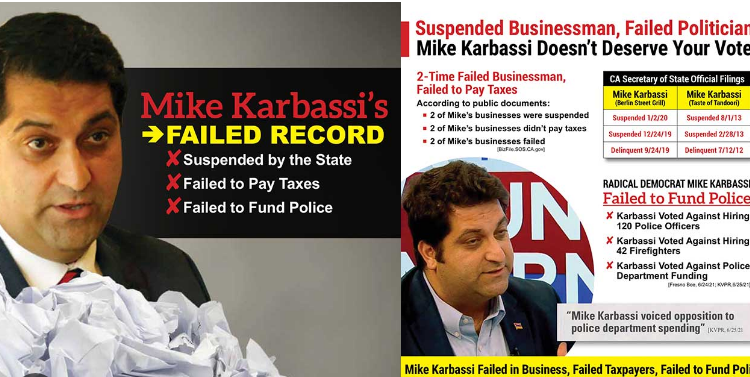In a significant legal development, the Fifth District Court of Appeal has vacated a previous anti-SLAPP ruling that favored Assemblymember Esmeralda Soria (D–Fresno) and decided to reinstate Fresno City Councilman Mike Karbassi’s lawsuit against her. This ruling revolves around a contentious defamation battle stemming from campaign mailers used during the June 2022 primary election for Assembly District 27. The decision not only breathes new life into the lawsuit but also raises important questions about political discourse, defamation claims, and the boundaries of political campaign communications.
The legal clash between Mike Karbassi and Esmeralda Soria can be traced back to their roles on the Fresno City Council and their subsequent rivalry in the 2022 primary election. Soria emerged victorious in the election, but before the primary, she distributed a campaign mailer that became the focal point of the dispute. This mailer highlighted various aspects of Karbassi’s record, including his use of taxpayer funds and his association with a consultant previously found guilty of assaulting a college student.

The Defamatory Mailer
The crux of the defamation case revolves around the contents of Soria’s campaign mailer. The mailer featured Karbassi’s picture alongside statements such as “Guilty of battery against a student,” “Arrested and cited for assault and battery of a 19-year-old female student,” and “Was I wrong? Yes, I touched her when she didn’t want to be touched.” Karbassi responded to this mailer by filing a lawsuit against Soria, alleging defamation.
The Anti-SLAPP Motion
Initially, Soria filed an anti-SLAPP (Strategic Lawsuit Against Public Participation) motion to have the lawsuit dismissed. The motion argued that the statements in the mailer were protected political speech and did not constitute defamation. The lower court agreed with Soria’s position and granted the anti-SLAPP motion, effectively dismissing Karbassi’s lawsuit.
The Appeals Court’s Ruling
However, the recent ruling by the Fifth District Court of Appeal has introduced a new twist to the legal battle. The appeals court decided to vacate the anti-SLAPP motion, leading to the reinstatement of Karbassi’s defamation lawsuit. The court’s decision primarily hinged on the interpretation of the mailer’s contents and whether they could reasonably be understood as referring to Karbassi himself or solely to the consultant he had hired.
Karbassi contended that a “reasonable reader” would not interpret the criminal allegations as being directed at him personally. In contrast, Soria argued that the mailer was clear in its intention to criticize Karbassi’s decision to employ the consultant and did not accuse him of committing a crime.
Implications of the Ruling
The appeals court’s ruling has broader implications for the realm of political campaigns, free speech, and defamation law. It underscores the delicate balance between the right to engage in political discourse and the responsibility to avoid making false or defamatory statements about opponents. While political speech enjoys certain protections, there are limits, especially when it comes to making serious criminal accusations.
The court’s decision also raises questions about the use of campaign materials and the need for clarity in messaging. In this case, the appeals court found that the mailer did not clearly separate the allegations concerning the consultant from those targeting Karbassi. This lack of clarity played a pivotal role in reopening the defamation lawsuit.
The Intention Behind the Mailer
One key aspect of the appeals court’s ruling was the assessment of Soria’s intentions when publishing the mailer. The court found evidence to suggest that Soria may have intended for some readers to misattribute criminal conduct to Karbassi, even though she knew he had not committed a crime. This element adds complexity to the case, as it delves into the realm of the publisher’s state of mind and intent in disseminating potentially defamatory information.
Read More:
- Mom killed after mom and son stab each other, police say
- Alleged sex assault on female officer by inmate raising alarm on California’s prison policies
- Who is supplying NYC’s illegal weed shops?
In conclusion, the reopening of the Karbassi vs. Soria defamation lawsuit sheds light on the intricacies of political communication, defamation claims, and the boundaries of protected speech. As the legal battle continues in Fresno County Superior Court, it serves as a reminder that the world of politics is not immune to the scrutiny of the law, particularly when it comes to allegations of defamation and the impact of campaign materials on public perception.

